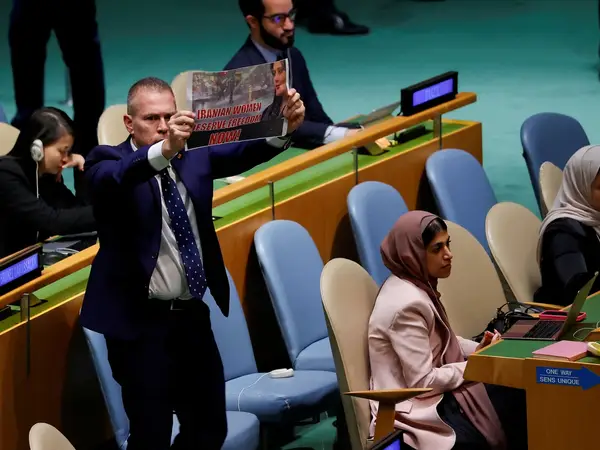Israel’s ambassador to the United Nations was the only diplomat to protest at President Ebrahim Raisi’s speech Tuesday but was escorted away by security.
While Ebrahim Raisi, the man known as the ‘Butcher Of Tehran’ for his history of gross human rights violations, was addressing the UN with an onslaught of regime propaganda including claiming the country is an “unparalleled” beacon of women’s rights, Israel’s ambassador to the UN was physically escorted off site for protesting Raisi’s presence.
Ambassador Gilad Erdan held a poster calling for women’s rights in Iran, showing the face of Mahsa Amini, the face of the Woman, Life, Freedom movement after her death in morality police custody last year, and was forcefully removed from the United Nations by security.
Erdan was the only member of the UN General Assembly to protest. In contrast, in March, more than 100 diplomats from 40 Western countries and allies including Japan walked out of a speech by Russian Foreign Minister Sergei Lavrov to the top UN human rights forum in protest over Russia's invasion of Ukraine. The boycott by envoys from the European Union, the United States, Britain and others left only a few diplomats in the room including envoys from Syria, China and Venezuela.
Soon after, in April, the United States, Britain, Albania and Malta walked out on Russia's envoy for children's rights, Maria Lvova-Belova, who the International Criminal Court wants to arrest on war crimes charges, as she spoke by video to UN Security Council members.
Emboldened, Raisi - who as a prosecutor, took part in the 1988 mass executions that killed some 5,000 political prisoners in Iran - told the UN on Tuesday that the United States should prove its "goodwill and determination" to revive Tehran's 2015 nuclear pact as months of indirect talks between the long-time foes have led nowhere. This was after he publicly stated that the US should "stop interfering in the countries of the Persian Gulf and other regions in the world and mind their own business".
Raisi was speaking on the back of a prisoner swap which saw five US convicted Iranians exchanged for five wrongly held US-Iranian citizens, in addition to $6bn in frozen Iranian funds freed up from South Korea.
In a show of appeasement to the barrage of criticism levied to the Biden administration for the deal, which critics say opens the door to yet more hostage diplomacy by Iran, putting further Americans at risk, the administration levied more sanctions on seven individuals and four entities in Iran, China, Russia, and Turkey for their roles in Iran's UAV and military aircraft development.
However, while Raisi was addressing the world’s leaders, Russia’s Defence Minister, Sergei Shoigu, who is in Tehran, announced that “relations between Russia and Iran in the field of defense are developing dynamically. The number of meetings at different levels has increased. The relationship is developing well,” suggesting the $6bn in released funds will be used to fund the regime’s military and nuclear development.
Raisi is reveling in the PR potential of the visit as the world watches. Only Monday, on the sidelines of the UN General Assembly, he denied sending weapons to Russia, in spite of extensive evidence otherwise which has led to multiple nations including the US and UK, issuing sanctions against Iran.
While the Russian defense minister speaks of burgeoning ties from Tehran, Raisi said from New York, “We are against the war in Ukraine”, while evidence has also shown the two nations building munitions factories together in Russia.
Despite the global backlash for Raisi’s welcome in the UN, the Council of Foreign Relations (CFR) has gone ahead with its invitation to meet with him in New York. Iranian actress and rights activist Nazanin Boniadi, a member of CFR, refused to attend the private meeting.
“Some say that these meetings allow us to hold the feet of dictators to the fire, but the past 44 years have shown us that not only are these meetings futile, the Islamic Republic also uses them to legitimize themselves on the global stage,” she wrote on X.
“Continuing the same practices and expecting tyrants to change their behavior seems completely irrational,” she added. “Democratic institutions hold the key to tipping the balance of power in favor of those risking everything for freedom. If you afford your members the opportunity to meet dictators behind closed doors, then at least offer them the chance to also hear from their opponents in the open.”
